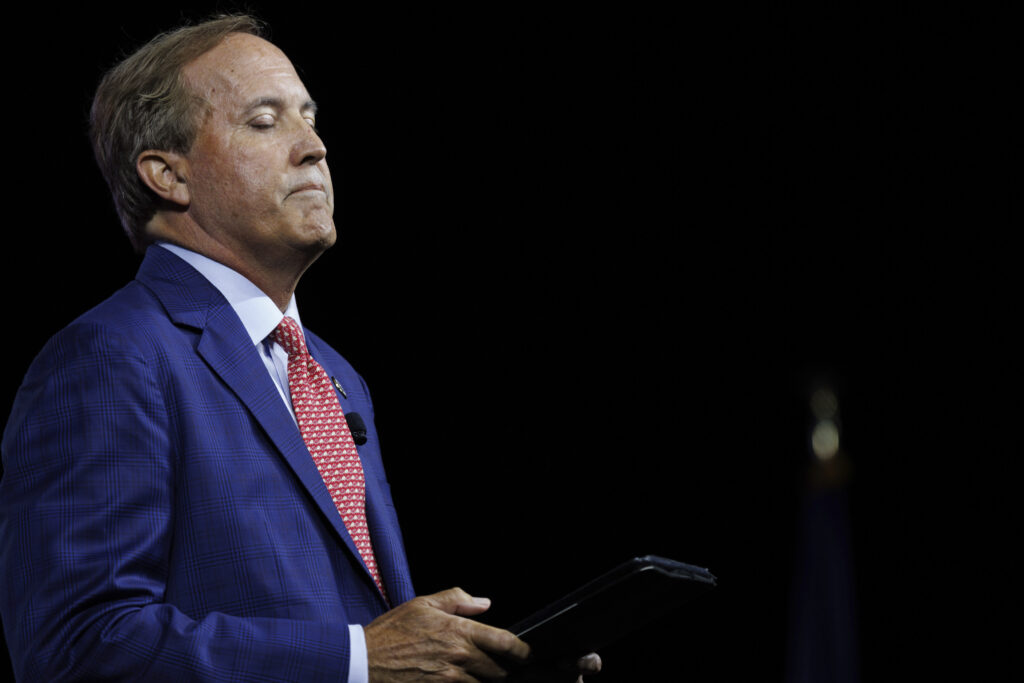Texas AG Files Lawsuit Seeking to Remove 13 State Democrats From Office

Texas Attorney General Ken Paxton (R) asked the Texas Supreme Court Friday to remove 13 Democrats from office, days after Gov. Greg Abbott (R) filed a similar petition. State Rep. Gene Wu (D), the sole target of the governor’s lawsuit, responded to allegations in a filing Friday, calling Abbott’s legal challenge an “unprecedented request” to remove an elected member of the Texas House of Representatives using the judiciary.
Wu, the chair of the Texas House Democratic Caucus, argued the Texas Constitution grants only one entity the power to expel him or his colleagues: the Texas House, through a two-thirds majority vote. He asked the court to rule against not only Abbott’s petition, but also the parallel legal action from Paxton.
“The Court should put to rest the notion that the judiciary can expel a member of the House of Representatives,” Wu’s filing said.
The Texas Legislative Progressive Caucus defended its members named in the lawsuit Friday.
“This move from Paxton is straight from the playbook of dictators and fascists who know they cannot win fair elections,” the group said in a statement.
In an unusual move, Paxton earlier this week criticized Abbott for filing his lawsuit, which Paxton said could be brought by the attorney general, but not the governor.
In his lawsuit, Paxton argued the Texas Supreme Court should declare Democrats’ positions vacant on the grounds that they have “abandoned their offices” – even as one of Paxton’s targets filed a new piece of legislation this week while breaking quorum.
Wu, responding to Abbott’s lawsuit, argued he had not abandoned his office, but was in fact complying with his duty. His filing cited a 2021 Texas Supreme Court ruling that – while affirming the House’s right to arrest members to compel their attendance – also admitted the Texas Constitution “does enable quorum breaking by a minority faction.”
Sen. John Cornyn (R) filed an amicus brief Friday supporting Abbott’s lawsuit – rather than take a stand with Paxton, who is running a highly competitive primary challenge against Cornyn for his Senate seat.
With Texas Republicans rushing through a mid-decade redistricting process to give the GOP five more seats in Congress in 2026, Democratic lawmakers are using their only tool to stop the proposed congressional map. By leaving the state, Democrats ensure Republicans don’t have enough members present to hold a vote.
The Texas House used its power Monday to issue civil arrest warrants against the missing members, but even Republicans have acknowledged the warrants aren’t enforceable while Democrats are staying in ally states like Illinois, where Gov. JB Pritzker has said they will be protected. Paxton filed a petition Thursday in Adams County, Illinois, asking a court to force the arrest and return of House Democrats across state lines.
With his lawsuit filed Friday, Paxton followed through on his previous threats to ask the Texas Supreme Court – a panel of nine elected Republicans, six of whom were appointed by Abbott – to remove quorum-breaking Democrats from office.
While Abbott’s petition asked the court to remove Wu from office and declare his seat vacant, Paxton’s lawsuit expanded that request to include a dozen more lawmakers.
Democrats targeted by Paxton’s lawsuit include: Wu, Rep. Ron Reynolds, Rep. Vikki Goodwin, Rep. Gina Hinojosa, Rep. James Talarico, Rep. Lulu Flores, Rep. Mihaela Plesa, Rep. Suleman Lalani, Rep. Chris Turner, Rep. Ana-Maria Ramos, Rep. Jessica Gonzalez, Rep. John Bucy III and Rep. Christina Morales.
Paxton’s office also sued Beto O’Rourke Friday, arguing the former congressman’s efforts to help Democrats fundraise to cover the costs of their quorum break constitute bribery.
O’Rourke swiftly responded on social media: “We just sued Ken Paxton in state court. Taking the fight directly to him.”
Wu, in his response to Abbott’s lawsuit, also argued against bribery allegations. He noted Abbott sent a fundraising appeal to his supporters “requesting ‘help’ for his border-wall construction” – and concluded that neither of their fundraising efforts violated the law.
“As the Penal Code recognizes, such contributions and appeals are not bribery because they do not involve a quid pro quo exchange,” the filing said, adding that bribery would require the recipient to take action they otherwise would not have done.
Wu went on to invoke his right to a jury trial, and said the case – “to the extent there is a proper form” – should have been brought in district court, not the Texas Supreme Court, as there are disputed facts in the case.
“Because the Governor’s arguments rely on disputed factual allegations – which cannot be called facts because no competent evidence has been submitted – this Court should proceed no further,” the filing said.